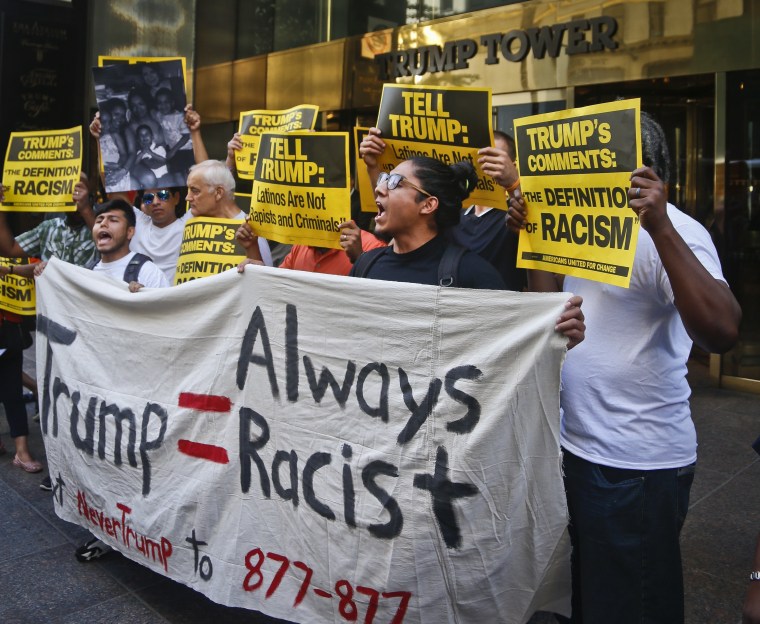In the beginning, Donald Trump said Mexicans who come here are rapists, criminals and people bringing drugs and problems.
Now he’s saying he’ll work with immigrants not here legally, but the bad ones are going to be thrown out.
Does that mean he has flip-flopped? To several Latino political and immigration experts, it’s more of the same.
Trump’s refashioning of his views on immigrants follows nearly a year of using Latinos and immigrants as a wedge issue to emerge as the GOP nominee from a crowded primary field.
Calling his latest stand a flip-flop, means regarding Trump as being like any other politician and his original policies as having been real policy proposals, said Ian Haney Lopez, a law professor at University of California, Berkeley and author of “Dog Whistle Politics: How Coded Racial Appeals Have Reinvented Racism & Wrecked the Middle Class.”
“To criticize his policy shifts is to take his policies serious as policies, but they were never serious with respect to immigration ... They served as markers for racial resentment.” Ian Haney Lopez, race expert
The flip-flopper criticism has become a stock criticism of politicians. Using it against Trump, however, normalizes him, Haney Lopez said.
“To criticize his policy shifts is to take his policies serious as policies, but they were never serious with respect to immigration,” Haney Lopez said. “They served as markers for racial resentment.”
Lopez said Trump was never going to ban all Muslims , deport all immigrants, build a border wall on the U.S.-Mexican border or going to deport 11 million people. They were impossible as policies and illegal as law, he said.
“These supposed policy statements were symbols of animosity towards Mexicans and Muslims,” he said.
Trump has been faced with polls showing a widening gap between him and Hillary Clinton nationally in the presidential race, although some polls show the race tight in certain states.
Since meeting with a group of GOP Hispanics last weekend, he has said he’d work with immigrants who have been here 20 years and that he was softening his deportation ideas, although he has given little detail on how he will do so. He plans a speech in Arizona on immigration next week.
Related: GOP Hispanics: Trump Open to Easing His Policies on Undocumented Immigrants
In a speech in New Hampshire Thursday, he pushed back on accusations that he or his policies are racist. He accused Democrats of using the racist label to dismiss Americans who want a safe border, their laws respected, security in their communities and jobs.
“I will never apologize for making it my priority . . . to protect American citizens above every other single consideration,” he said.
But Trump has a difficult time making the case that his views have changed when his campaign’s CEO is Steve Bannon, the executive chairman of the right wing Breitbart News outlet, when he has campaigned with Arizona Sheriff Joe Arpaio, when he’s enlisted Ann Coulter in his campaign and when white supremacists and nationalists have lined up behind him, a group of immigration experts argued Thursday afternoon.
Diego von Vacano, an associate professor in Texas A&M’s political science department, said Trump's attempt to shift his tone suggests that he is trying to find policy solutions late in the game. He doubted Latinos will be convinced he’s undergone a transformation.
Trump’s recent appearance with Nigel Farage, who helped lead the campaign for a referendum on Britain’s exit from the European Union, suggests otherwise, von Vacano said.
“For him to be with Trump, it’s a signal that’s (the campaign) is still anti-immigrant, Nigel having been seen as anti-immigrant in the UK as well,” von Vacano said.
“If at least he acknowledged what he said and explained his reason for the transformation, people would say, ok, he’s trying to fix immigration,” he said.
Trump's effort is being seen more as a ploy to attract white voters than Latino and African American voters, in part because he has yet to make appearances before in those communities. Very early in the primaries, Trump had promised to do a candidate Q&A with the U.S. Hispanic Chamber of Commerce, but he backed out of the agreement.
Even though he plans to vote for Trump, Rafael Flores, a Republican strategist in New York, agreed that few Latinos would be convinced that Trump has undergone a change of heart. It’s all come too late and people have made up their minds, he said.
"I really hope that Mr. Trump changed his vision or changes his comments that he makes on the immigration issue ... but a the end of the day, am I going to vote for Donald Trump, absolutely. I'm never going to vote for Hillary. He's a little crazy, but sometimes in life there is a little crazy. Hillary, I think, lied to the American people," Flores said.
Clinton, in a speech in Las Vegas, focused on the racism of Trump's campaign, who he surrounds himself with and his record on race and discrimination.
"I know some people will want to give Trump the benefit of the doubt. They hope that he will reinvent himself – that there's a kinder, gentler more responsible Donald Trump waiting in the wings somewhere ... But the hard truth is, there's no other Donald Trump. This is it," Clinton said.
Related: Clinton: Trump Taking Race Baiting Ideas Into the Mainstream
There may be some familiarity in the language Trump is using as he tries to adjust his immigration talk, said Angie Kelley, executive director of the Center for American Progress Fund. She said it's made up of the "buzzwords" used by moderate Republicans "when they are trying to appear friendly, while holding a knife behind their back."
“He’s really hoping that there’s some nationwide amnesia sets in and we forget what he’s been saying about the community for the last 15 months,” Kelley said. “We’re not going to forget.”

